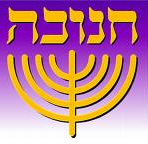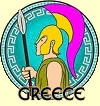Chanukah is a historical feast of Israel. It is not found among
the seven biblical feasts of Redemption (Lev. 23), however it is a feast which
celebrates the redemption of Israel from their enemy’s hands.
Chanukah is a Hebrew word that means “Dedication”. It is a feast that celebrates the rededication of the
Temple, after being desecrated by the enemy.
This feast is also known as the “Feast of Lights”. It celebrates the miracle of light defeating
darkness.
In short, Chanukah is a feast of miracles. We celebrate
God’s triumph even around negative circumstances that seemed impossible to
overcome.
HISTORY
The history of Chanukah takes place in the “intertestamental
period”; that is, in that 400 year period between the Old and the New Testament.
In the New Testament, we see a reference to this feast when
Jesus went to Jerusalem to celebrate it. Remember that Jesus lived in Galilee,
but he would go up to Jerusalem to celebrate the feasts.
(John 10:22-23) At that time
the Feast of Dedication took place at Jerusalem. It was winter, (23) and Jesus
was walking in the temple, in the colonnade of Solomon.
In the world’s history books, it is written that the Greek
and Roman culture “illuminated” the world. But for Israel’s history it is the
opposite. The period of Greek influence is the one that is considered as the
period of obscurantism. From the Hebrew perspective, light comes from the Word
of God, and anything that opposes it is “darkness”. This conflict of
perspectives is the central theme of Chanukah.
HISTORICAL BACKGROUND
 In his eagerness to rule the world, Alexander the Great
conquered a great part of the civilized world, from Greece until India and
Egypt, including the land of Israel. His conquest was not only military, but
also cultural. He wanted to Hellenize the whole world.
In his eagerness to rule the world, Alexander the Great
conquered a great part of the civilized world, from Greece until India and
Egypt, including the land of Israel. His conquest was not only military, but
also cultural. He wanted to Hellenize the whole world.
Hellenize = Making others adopt the culture of Ancient Greece.
The Greeks were not only military conquerors,
but also cultural. Wherever they went, they would leave their cultural
influence. They considered themselves superior to all the other people, whom
they considered uncivilized. They didn’t see themselves as conquerors, but as
persecutors and even saviors.
When Alexander died, his empire was divided between the
generals who served him. Israel and Syria were left in charge of the general
Seleucus, who was in charge of dispersing the Greek culture in that region.
Almost all of the towns were easily adapted to the Hellenic
culture, but in Israel they didn’t find any cultural emptiness. On the
contrary, they found themselves with people that had a more advanced culture,
with a well defined philosophy of life and an education superior to the rest of
the peoples. At first, the Jews received the Greeks with open arms, since both
cultures loved knowledge and wisdom. But with time, it was made evident that
both ways of thinking were not compatible with each other’s essence, instead
they clashed. The differences were not only contrasting, they were
insurmountable.
The effect of this convergence of thoughts was that some
Jews were Hellenized, while others, faithful to their beliefs, had conflicts
with the conquerors.
Let’s see some examples of the contrasts of mindsets between
Jews and Greeks.
* SUPREMACY AND SOVEREIGNTY
Greeks> For them, man was the center of everything. He is sovereign and controls his life and his surroundings. He does everything thinking about his own wellbeing.
Hebrews> They think that God is in control of everything. Man is a partner with God, but he is subordinate to Him and must submit to the divine order.
* GOD
Greeks> Are polytheists. They had many gods,
for each activity. The Greek gods were made in the image of man, and have their
same passions and weaknesses.
Hebrews> Man is made in the image of God;
therefore, they must act like He does.
* INTERNAL VS EXTERNAL
Greeks> They place a lot of emphasis on the
external. They get carried away with appearances. They invest a lot on external
beauty.
Hebrews> They place an emphasis on the
internal. They value education, moral and spiritual values more than physical
appearance.
* FAITH
Greeks> They place their faith on human reason and intellect.
They think that human reason has the answer to everything. For them, the
reality is only what they can see and prove. “See it
to believe it”
Hebrews> They place their faith in God. They
think that the answer to everything is in God, and they know that human reason
is limited. They acknowledge a spiritual reality that is over the physical
reality.
“Now faith is the assurance of things hoped
for, the conviction of things not seen” (Hebrews 11:1)
INTERNAL CONFLICT
The conflict between the Greek and the Hebrew
mentality not only came from the conquerors. There was also an internal
conflict, a tension between the Hellenized Jews and the ones who wanted to stay
loyal to tradition.
Today we can also see a similar conflict in the
church. There is a division between the ones who want to adapt to the world and
the ones who want to stay faithful to the Biblical principles.
The Hellenized Jews asked for help from the
king of Syria, Antiochus IV. They requested him to intervene in their country,
thinking that they wanted to “modernize” the nation of Israel. However, what
they managed to do was to cause more division.
In the beginning, Hellenization was purely
voluntary, but it later became mandatory because so many remained faithful to their beliefs. In the
end, the Jews that refused to get Hellenized were persecuted and even tortured.
In that time, the king Antiochus gave a decree
in which many of the issues in which the Greeks and the Hebrews clashed were
prohibited.
- They forbade the study of Torah
- They forbade the Shabbat rest
- They forbade celebrating the New Moons and the keeping of the Hebrew calendar
- They forbade circumcisions
- They forced the brides-to-be to spend a night with the Greek general before the wedding
This intervention by Antiochus IV led them to a
military war between the Greeks and the Jewish people, and finally in the
desecration of the Temple in Jerusalem - known as the “abomination of
desolation”.
 The king named himself “Antiochus Epiphanies”,
which means “God Manifest”. He thought of himself as god and was determined to
destroy all worship to the God of Israel. He was convinced that to be able to
rule over the Jewish people he had to destroy their religion and their culture.
He invaded the Temple in Jerusalem and turned it into a temple to the god Zeus
(II Maccabees 6:1-2).
The king named himself “Antiochus Epiphanies”,
which means “God Manifest”. He thought of himself as god and was determined to
destroy all worship to the God of Israel. He was convinced that to be able to
rule over the Jewish people he had to destroy their religion and their culture.
He invaded the Temple in Jerusalem and turned it into a temple to the god Zeus
(II Maccabees 6:1-2).
This is a prophetic shadow of what will also
happen in the last days, since those who do not submit to the world’s system
and to the Antichrist will be persecuted. In those days the “abomination of
desolation” will happen all over again (Dan. 11:31, 12:11).
(Matthew 24:9-22) Then they will deliver you up to tribulation and
put you to death, and you will be hated by all nations for my name’s
sake. (10) And then many will fall away and betray one another and
hate one another. (11) And many false prophets will arise and lead many
astray. (12) And because lawlessness will be increased, the love of many
will grow cold. (13) But the one who endures to the end will be
saved. (14) And this gospel of the kingdom will be proclaimed throughout
the whole world as a testimony to all nations, and then the end will come. (15)
“So when you see the abomination of desolation spoken of by the prophet Daniel,
standing in the holy place (let the reader understand), (16) then let
those who are in Judea flee to the mountains. (17) Let the one who is on
the housetop not go down to take what is in his house, (18) and let the
one who is in the field not turn back to take his cloak. (19) And alas for
women who are pregnant and for those who are nursing infants in those
days! (20) Pray that your flight may not be in winter or on a
Sabbath. (21) For then there will be great tribulation, such as has not
been from the beginning of the world until now, no, and never will
be. (22) And if those days had not been cut short, no human being would be
saved. But for the sake of the elect those days will be cut short.
The feast of Chanukah
not only looks at the historical past, but also at the prophetical future.
This year, Chanukah will be celebrated starting on the evening of December 6 and ending on the
evening of December 14.



Comments
Post a Comment